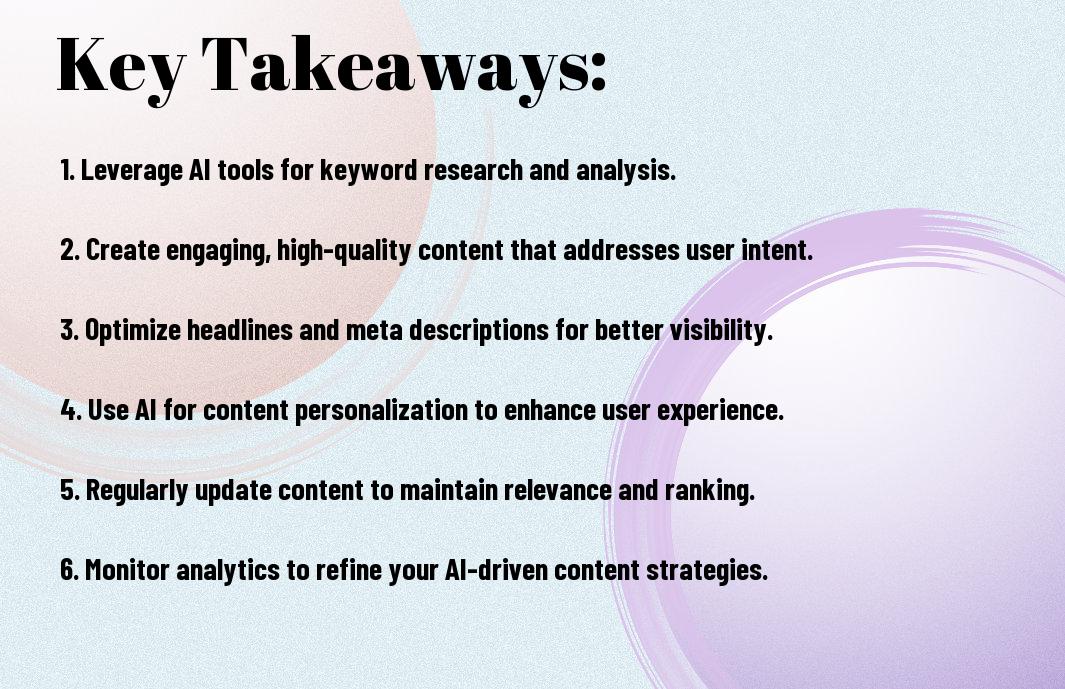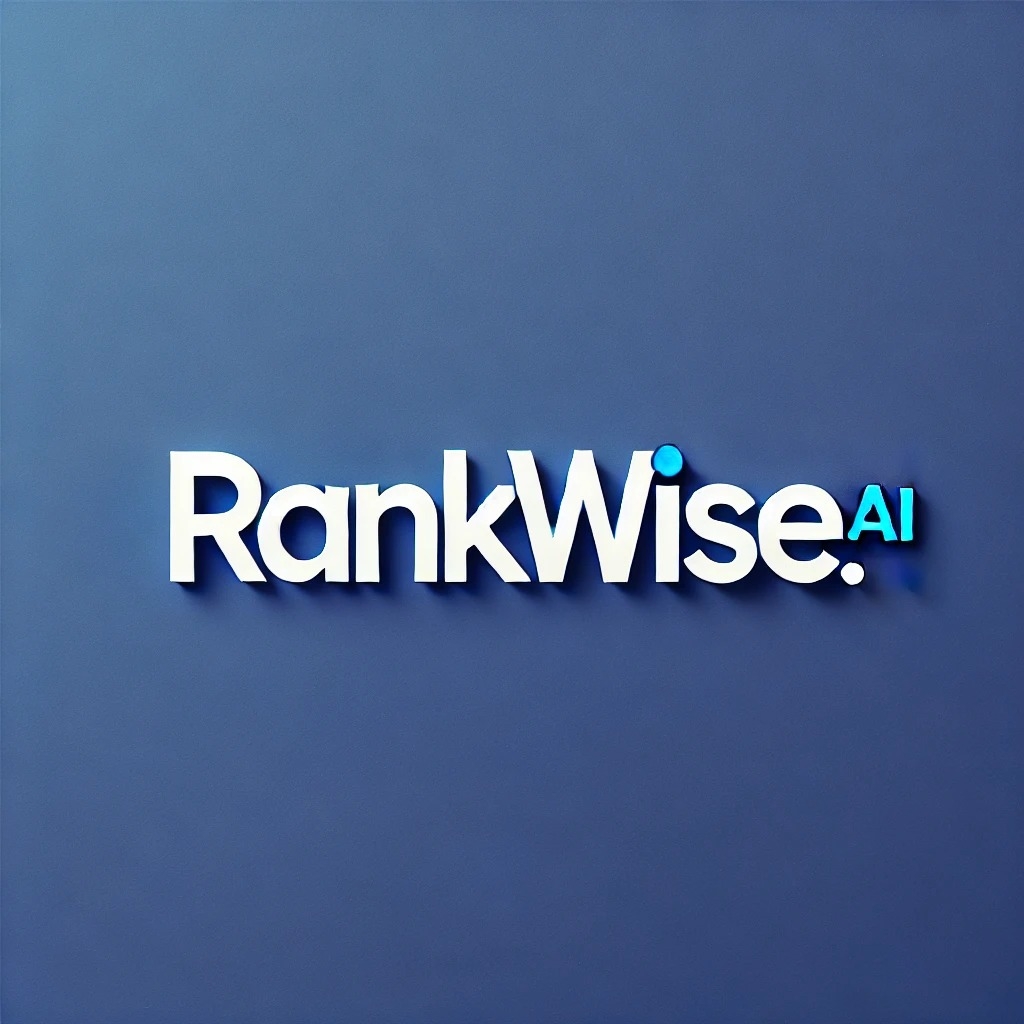
Many businesses often struggle to enhance their online presence, but by leveraging AI-optimized content, you can significantly improve your SEO performance. This blog post will guide you through effective strategies and best practices to harness the power of artificial intelligence for creating content that attracts visitors, engages readers, and boosts your search engine rankings. With the right techniques, you can stay ahead in the digital landscape, ensuring your content not only reaches your target audience but also meets their needs effectively.

Key Takeaways:
- Keyword Research: Utilize AI tools to identify high-traffic keywords that align with your content strategy and audience intent.
- Content Creation: Leverage AI-generated suggestions to create engaging and relevant content that meets the needs of your target audience.
- Optimization Techniques: Implement on-page SEO practices, including optimizing headlines, meta descriptions, and alt texts using AI insights.
- Content Personalization: Use AI to analyze user behavior and preferences, allowing for personalized content experiences that increase engagement and retention.
- Competitor Analysis: Employ AI-driven analysis to understand competitors’ strategies, helping to refine your own SEO tactics and gain a competitive edge.
- Performance Tracking: Utilize AI tools for tracking and analyzing content performance, enabling data-driven decisions to enhance future content efforts.
- Continuous Learning: Stay updated on AI advancements and SEO trends to continuously innovate and improve your content strategy.
Understanding SEO and AI
Your journey into optimizing your content for search engines begins with a clear understanding of Search Engine Optimization (SEO). SEO is a collection of strategies designed to improve the visibility of your website in search engine results pages (SERPs). By effectively employing these tactics, you can attract more organic traffic to your site, leading to increased engagement and potential conversions. The main goal of SEO is to ensure that your content is not only available but also relevant to the queries your audience is searching for.
The Fundamentals of SEO
One of the primary components of SEO is the use of keywords, which are the terms and phrases that users enter into search engines. By identifying and integrating these keywords into your content, you can help search engines understand the relevance of your pages. Additionally, on-page SEO factors such as title tags, meta descriptions, and image alt texts play a significant role in how your site ranks. Off-page SEO, including backlinks and domain authority, also contributes to your site’s overall credibility and trustworthiness.
Engaging with SEO also means focusing on the overall user experience. This encompasses factors like page load speed, mobile optimization, and even the readability of your content. When users find your site useful and easy to navigate, search engines are more likely to reward you with higher rankings, leading to an increase in your site’s visibility.
The Role of AI in Content Creation
Above all, AI is revolutionizing how you approach content creation. Artificial intelligence tools can analyze vast amounts of data to identify trends and patterns that inform which topics will resonate most with your audience. By leveraging AI, you can generate high-quality, relevant content that meets your audience’s needs more effectively than ever before. These tools don’t just assist in content generation; they also help with keyword optimization, ensuring that the necessary terms are included naturally throughout your writing.
In addition, AI can significantly enhance your ability to personalize content for different segments of your audience. By analyzing user behavior, AI tools can help you tailor your content to specific demographics, resulting in a more engaging experience for readers. This personalization combined with intelligent data analysis not only aids in creating content that aligns with SEO best practices but also enhances user satisfaction—a win-win in the competitive landscape of digital marketing.

Benefits of AI-Optimized Content
There’s no denying that employing AI-optimized content can dramatically enhance your SEO efforts. By integrating artificial intelligence into your content strategy, you gain access to sophisticated tools that can analyze vast amounts of data, leading to improved results in your online visibility. This modern approach not only saves time but also provides insights that traditional methods may overlook. Ultimately, the benefits of AI-optimized content extend beyond mere ranking improvements, influencing user behavior and overall website performance.
Enhanced Keyword Research
Content optimization begins with an understanding of the keywords that drive traffic to your site. AI can help you identify these key phrases more effectively than manual methods. Using advanced algorithms, AI tools can analyze search trends and user intentions, delivering a list of potential keywords tailored specifically to your niche. This means that you can target terms that are not only popular but also relevant to your audience, allowing you to craft content that resonates with potential readers.
Furthermore, AI tools can provide insights into keyword difficulty and competitiveness, enabling you to optimize your strategy accordingly. You’ll be able to identify low-competition keywords that represent untapped opportunities for your content, ultimately resulting in a more efficient ranking strategy. By leveraging AI in your keyword research, you ensure that your content doesn’t just exist in a vacuum; instead, it becomes part of a larger conversation within your industry.
Improved Content Relevance and User Engagement
Engagement is a key factor in determining your content’s performance. AI-driven insights enable you to assess what your audience truly values, allowing you to create articles that address their specific interests and needs. By analyzing user behavior and preferences, AI can help you develop content that is not only more relevant but also encourages interaction. This leads to higher engagement rates, illustrating to search engines that your website provides substantial value to users.
Considering the vast amount of content available online, it’s crucial that your material stands out by addressing the unique preferences of your audience. AI can analyze past user data and recognize patterns that inform you about your readers’ likes and dislikes. This means satisfaction isn’t just about quality; it’s about delivering what your audience wants when they want it, ultimately helping you build stronger connections with potential customers.
Efficiency in Content Generation
For many creators, content generation can be a time-consuming task. Utilizing AI tools significantly streamlines this process. Automated content generation capabilities allow you to produce drafts quickly, meaning you can focus your efforts on refining and perfecting your messaging without sacrificing quality. With AI at your side, you can embrace a *number* of formats, making it easier to cater to the various types of content your audience prefers, whether it be blog posts, social media updates, or promotional materials.
A particularly noteworthy aspect of AI-generated content is its ability to deliver a practical framework that ensures consistency across your publications. This consistency is crucial for successful branding and helps maintain your audience’s trust. As you leverage AI to enhance your content generation process, you’ll find that your ability to produce high-quality, engaging material at scale improves, ultimately driving better results in your SEO initiatives.

Developing an AI-Driven Content Strategy
After identifying the role AI can play in boosting your SEO efforts, you’ll want to launch on developing an AI-driven content strategy. This approach centers around tailoring your content to resonate with your target audience while maximizing search engine visibility. By utilizing AI technologies, you can streamline this process, making it both efficient and effective.
Identifying Target Audiences
Content creation begins with a deep understanding of your target audiences. Knowing who they are helps you craft content that meets their needs and interests. Use AI tools to analyze demographic data, behavioral patterns, and preferences. This information allows you to segment your audiences effectively, which means you can create customized content that appeals to each specific group. Tailoring your message not only enhances engagement but also fosters loyalty, increasing the likelihood of conversions.
Furthermore, AI can facilitate the identification of emerging trends within your audience. By tracking search behaviors and social media interactions, you can uncover what topics are trending and gain insights on what your audience craves. This data-driven approach empowers you to create timely, relevant content that drives traffic to your website.
Setting Clear SEO Goals
One of the first steps in your content strategy should be setting clear SEO goals. Outline what you hope to achieve with your content, whether it’s increasing organic traffic, improving search ranking for specific keywords, or enhancing user engagement metrics. Establishing measurable objectives ensures that your efforts are focused and aligned with your overall business goals.
By defining these goals, you also create benchmarks that will help you assess the performance of your content-related efforts. Analyzing these metrics will enable you to understand which strategies work best for your audience and which areas may require adjustment or improvement. This approach allows for continuous optimization as your content strategy evolves.
Indeed, setting clear goals also leads you to prioritize content that aligns with your SEO objectives. This targeted content creation helps in efficiently allocating resources, ensuring you focus on developing high-impact topics that drive your desired results and communicate your brand’s message effectively.
Leveraging AI Tools for Content Insights
Content strategy can greatly benefit from leveraging AI tools for content insights. These tools analyze vast amounts of data to pinpoint gaps in your current content offerings, revealing opportunities for new topics or deeper coverage of existing subjects. By trusting AI to process this information, you can streamline your content ideation process, allowing you to create content that is both relevant and valuable to your audience.
Apart from identifying gaps, AI tools can also help you optimize your current content by suggesting enhancements based on trending keywords and phrases. Integrating these insights into your strategy keeps your content aligned with the interests and needs of your audience, and it positions your brand as an authority in your niche.
Leveraging the power of AI insights not only helps in creating better content but also equips you with the knowledge to stay ahead of competitors by anticipating what users seek. This strategic advantage enhances your ability to meet the ever-evolving needs of your audience, ensuring your SEO efforts yield the expected positive results.
Best Practices for Creating AI-Optimized Content
Many marketers and content creators are increasingly leveraging artificial intelligence to enhance their SEO strategies. By implementing best practices when creating AI-optimized content, you can stay ahead of the competition. For deeper insights on this subject, refer to A Guide to SEO Content and AI. This guide provides valuable information that can support your content optimization endeavors.
Utilizing AI for Keyword and Topic Discovery
Best practices in keyword and topic discovery involve harnessing AI tools that analyze search trends, semantic relationships, and user behaviors. By using these tools, you can identify keywords that not only resonate with your target audience but also align with the latest search engine algorithms. This method of discovery ensures that your content is relevant and optimized from the ground up.
Furthermore, AI can generate topic ideas based on existing content gaps in your niche. By analyzing what competitors are publishing and the type of content that performs well, you can create high-impact articles that fill missing links in the conversation. This strategic approach allows you to captivate your audience while improving your overall SEO performance.
Crafting Quality Content with AI Assistance
Content creation can be significantly enhanced by utilizing AI tools. These tools not only assist in drafting articles but also ensure that the content remains engaging and coherent. Using AI-generated suggestions, you can craft customized pieces that speak directly to your audience’s interests and pain points.
With AI’s capability to analyze large datasets, you can create content that is well researched and factually accurate. For example, AI can assist in compiling statistics or citing reputable sources, thus enhancing the credibility of your content. This level of detail is vital for retaining your audience’s trust and encouraging them to share your content.
Implementing Natural Language Processing Techniques
Above all, employing Natural Language Processing (NLP) techniques can greatly enhance the readability and user-friendliness of your content. These techniques allow you to optimize your writing style, ensuring that it aligns with the linguistic patterns preferred by your target audience. This not only keeps your readers engaged but also benefits your SEO as search engines prioritize quality content that resonates with users.
Assistance from NLP tools can help ensure your content is structured logically, highlighting the most relevant information clearly and concisely. By analyzing the sentiment and tone of your content, these tools ensure that your message is communicated effectively, ultimately improving user satisfaction and engagement rates. This thoughtful integration of NLP can elevate your content’s impact and visibility in search engine results.
Measuring the Effectiveness of AI-Optimized Content
Once again, understanding the effectiveness of your AI-optimized content is imperative for driving continuous improvement. You need to leverage specific metrics to assess how well your content performs in terms of search engine visibility and user engagement. For an in-depth exploration of the intersection between AI and SEO, check out A Guide to AI and SEO. By focusing on the right indicators, you can identify areas for enhancement and maximize the benefits of your optimization efforts.
Key Performance Indicators (KPIs)
Below are the key performance indicators (KPIs) you should monitor closely to gauge your AI-optimized content’s performance. Metrics such as organic traffic, bounce rates, page loading speed, and social shares can provide insight into user engagement and the effectiveness of your SEO strategies. Tracking these indicators allows you to establish a baseline that can help you understand how your content evolves over time.
Furthermore, measuring the click-through rate (CTR) on your titles and meta descriptions can reveal how compelling your content is to users upon search results. If the CTR is low, it might indicate that your titles need better optimization or that the content does not resonate sufficiently with your audience’s interests.
Analytics Tools for SEO Monitoring
Performance analysis is made significantly easier with the right set of analytics tools. Tools like Google Analytics, SEMrush, and Ahrefs allow you to track various metrics including traffic sources, user behavior, and keyword rankings. These insights can help you pinpoint which AI-optimized content resonates best with your audience and drives the most engagement.
Considering the vast array of data provided by analytics tools, it is vital that you customize your dashboard to focus on the metrics that matter most to your specific goals. Your tools should ideally present a clear picture of your strengths and weaknesses regarding SEO performance, enabling you to make data-driven decisions.
Adjusting Strategies Based on Data Insights
Data insights are instrumental in refining your content strategy going forward. By analyzing specific performance trends, you can make informed adjustments to your content, thereby enhancing both its relevance and reach. For instance, if you observe that certain keywords yield high traffic but low conversion rates, it might be time to tweak the associated content or call-to-action elements.
Due to the rapid changes in search engine algorithms and user preferences, continuously revisiting and adjusting your strategies based on data insights is necessary for maintaining relevance in your market. This proactive approach will not only enhance your SEO performance but can also establish your brand as an authority in your niche.

Common Challenges and Solutions
All content creators face various challenges when using AI to optimize their SEO strategies. Understanding these challenges and identifying effective solutions can significantly improve your approach. The most common challenges include ensuring content quality, addressing duplicate content issues, and finding the right balance between automation and human touch. By tackling these challenges head-on, you can harness the full potential of AI to enhance your SEO performance.
Overcoming Content Quality Concerns
An area of concern in AI-generated content is the perceived lack of quality. You may worry that automated writing tools compromise creativity and depth. To address this, it is imperative to use AI as a tool rather than a replacement for your unique voice. Leverage AI’s strengths in data analysis and keyword optimization while still incorporating your own insights and expertise. This hybrid approach enables you to produce content that is both engaging and SEO-friendly.
Moreover, regular content review and editing are important practices. You can utilize AI tools for initial drafts or to gather information, but taking the time to refine and polish your work ensures that the final product meets your standards and resonates with your audience. By actively participating in the content creation process, you maintain the quality that both search engines and users value.
Addressing Duplicate Content Issues
For many content creators, duplicate content can present a significant hurdle. Search engines penalize sites that contain replicated content, which can affect your visibility and rankings. To combat this, you should ensure that each piece of content you produce is unique and thoroughly original. AI tools can assist in generating variations on topics, but it’s important that you add your own insights and angles to differentiate your content.
Further, implementing a content audit strategy is beneficial. Regularly reviewing your website for duplicate content ensures that you remain compliant with SEO best practices. Utilize tools that can analyze your existing content and identify any instances of duplication. By addressing these issues early and recalibrating your strategy, you can maintain your website’s integrity and enhance its performance in search engine results.
Balancing Automation with Human Touch
Across the SEO landscape, finding the right balance between automation and a personal touch is imperative for effective content generation. While AI can process data and generate content at a rapid pace, having a human element ensures that the content remains relatable, engaging, and contextually appropriate. Strive to strike a balance where you can automate certain tasks, like keyword research and data analysis, while still providing your unique perspective and emotional connection.
And, this balance enables you to scale your content efforts without sacrificing quality. By understanding when to lean into automation and when to apply your expertise, you can optimize your content for search engines while still resonating with your audience. Enriching content with personal anecdotes, case studies, and user experiences makes it more likely that your readers will engage and share it, ultimately enhancing your SEO results.
Future Trends in SEO and AI
Unlike the traditional methods of SEO that relied heavily on keyword stuffing and backlinks, the future of SEO is rapidly evolving. As technology continues to advance, search algorithms are becoming increasingly sophisticated. This evolution is paving the way for a more user-centric approach, which values quality content and relevance over mere optimization tactics. You need to be aware that these changes are not just a passing trend; they represent a shift towards enhancing the overall user experience when interacting with search engines.
The Evolution of Search Algorithms
At the core of this transformation is the progression of search algorithms. Over the years, major updates like Google’s Panda, Penguin, and Hummingbird have aimed to weed out low-quality content and reward authentic sources. As these algorithms become more refined, they are increasingly capable of understanding the context and intent behind each search query. Thus, your SEO strategies must also adapt by focusing on providing informative, engaging content that genuinely addresses users’ needs and queries.
AI Advancements in Content Creation
Among the technologies shaping the future landscape of SEO is artificial intelligence, which is revolutionizing content creation. Recent advancements in AI tools allow you to generate high-quality content tailored to your audience’s preferences and interests efficiently. These tools analyze vast amounts of data to determine what resonates with readers, enabling you to create personalized and relevant content that stands out in search results.
Considering the rapid pace of AI development, it’s important for you to stay informed about the latest tools that can aid in your content creation process. AI not only offers insights into trending topics but also assists in optimizing content for SEO by recommending keywords and headlines that are likely to drive traffic. By leveraging these advancements, you can create a cohesive strategy that keeps you competitive in the ever-evolving digital landscape.
Preparing for the Next Generation of SEO
Below the surface, it’s evident that the next generation of SEO will require a different skill set, one that encompasses both technical and creative abilities. As AI continues to enhance the way content is produced and consumed, you must shift your focus towards creating an engaging user experience. This means optimizing not just for search engines, but also for the human audience, integrating factors such as voice search and mobile usability into your strategies.
Generation after generation of SEO practices will demand that you remain flexible and adaptable to the changing landscape. Embracing new technologies, understanding the implications of AI advancements, and preparing for changes in algorithmic criteria are all part of ensuring your content remains visible and relevant. Adaptation will be your key to thriving in this new era of digital interaction.
Conclusion
Hence, you have explored various strategies and best practices for boosting your SEO with AI-optimized content. By understanding the power of AI in content creation and optimization, you can create material that not only resonates with your audience but also aligns with search engine algorithms. Employing techniques such as keyword research, content structuring, and utilizing AI tools can significantly enhance your online presence. By implementing these strategies, you position yourself as an authority in your niche, attract more visitors to your site, and improve your overall search rankings.
As you move forward, don’t overlook the impact of staying updated with the latest trends in SEO and AI. Continuous learning will equip you with the necessary tools and insights to pivot your strategies effectively. For a deeper understanding of how you can optimize your content for AI, consider checking out The Future of SEO: How to Optimize Your Content for AI …. Embrace these changes, and watch your SEO efforts yield fruitful results that elevate your brand visibility.
FAQ
Q: What is AI-optimized content and how does it relate to SEO?
A: AI-optimized content refers to text that has been created or enhanced using artificial intelligence tools. These tools analyze data to identify the most effective keywords, phrases, and structures that can improve a webpage’s visibility in search engine results. By leveraging AI to fine-tune content for SEO, businesses and content creators can enhance their chances of ranking higher on search engines and attracting organic traffic.
Q: What are some strategies for creating AI-optimized content?
A: To create AI-optimized content, consider implementing the following strategies:
1. Utilize keyword research tools powered by AI to identify high-traffic keywords relevant to your topic.
2. Personalize content based on audience analysis, ensuring that it speaks to the reader’s interests and needs.
3. Structure your content with headings and bullet points for better readability, and align it with best practices for on-page SEO.
4. Use AI-driven writing assistants to enhance grammatical accuracy and coherence, making the text more engaging.
5. Continuously analyze content performance through analytics tools to iteratively improve SEO strategies based on user behavior.
Q: What are some best practices for incorporating AI-generated content into a website?
A: When incorporating AI-generated content into a website, adhere to the following best practices:
1. Ensure original content creation to avoid duplication penalties from search engines.
2. Review and edit AI-generated content for clarity and relevance, maintaining a human touch.
3. Optimize meta tags, including title and description, using insights from AI tools.
4. Implement internal and external linking strategies to enhance content value.
5. Regularly update the content based on performance metrics and changes in search engine algorithms.
Q: How can I measure the effectiveness of AI-optimized content for SEO?
A: The effectiveness of AI-optimized content can be measured through various metrics, such as:
1. Organic traffic levels: Monitor changes in the number of visitors arriving through search engines.
2. Search engine rankings: Use tools to track where your content ranks for targeted keywords before and after optimization.
3. Engagement metrics: Assess time spent on the page, bounce rates, and user interactions to gauge content appeal.
4. Conversion rates: Analyze whether the optimized content leads to desired actions, such as sign-ups or purchases.
5. Backlink acquisition: Keep track of any backlinks gained post-implementation, as these can further boost SEO performance.
Q: Are there any limitations to using AI in optimizing content for SEO?
A: While AI can significantly enhance content optimization, there are limitations to consider:
1. Lack of nuanced understanding: AI tools may not fully grasp context or emotional tone, potentially leading to generic content.
2. Dependency on data: The effectiveness of AI-generated insights is contingent on the quality of input data, which can be incomplete or biased.
3. Algorithm changes: Search engines frequently update their algorithms, which may not be accounted for by AI tools immediately.
4. Brand voice consistency: Maintaining a unified brand voice requires careful human oversight in the editing phase post-AI generation.
5. Over-optimization risk: Relying too heavily on AI might result in content that feels overly optimized, potentially deterring readers and diminishing authenticity.





